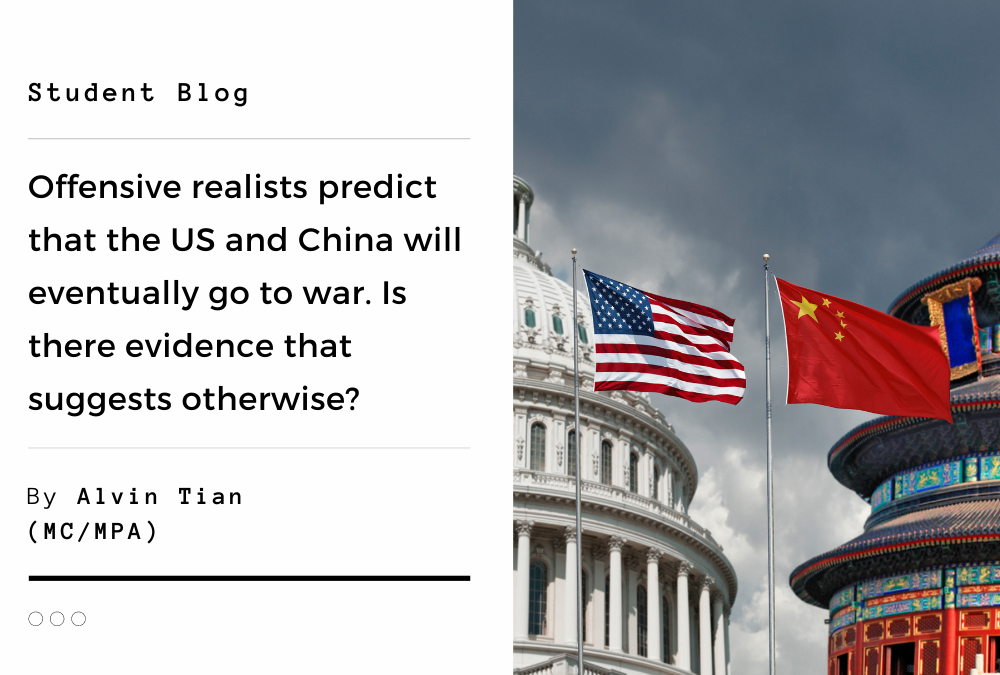Offensive realism, developed by Professor John Mearsheimer at University of Chicago, is the idea that great powers fear each other, and are always looking for opportunities to gain power at the expense of others. They do this to maximize its share of world power, regardless of domestic policy, foreign policy, and ideological differences on both sides. Offensive realism is pessimistic. It views the ultimate goal of great powers as achieving hegemony and therefore, the likelihood of war between great powers in an unbalanced multipolar world is very high. In Mearsheimer’s book The Tragedy of Great Power Politics, he predicts that China will continue to grow and eventually pursue regional hegemony, leading to security competition with the U.S. and raising the potential for war.
Mearsheimer’s prediction has been amazingly accurate so far. China has grown to be a great power, and the US has been working hard to contain China, calling China’s Asian neighbors to join a resisting coalition. Diplomatic relations between the two countries have reached a freezing point. Will things get even worse? In other words, will the two countries go to war? Even though I am a believer of offensive realism, I still have hope that the worst might not happen.
The core of the offensive realism is the theory that the structure of the international system causes states to compete for power to survive. But a missing part in the assumption that forms this theory is the rise of a common enemy of mankind, namely the pandemic and climate change. Both issues have become urgent worldwide due to COVID-19 and the recently frequent occurrence of catastrophic weather.
It might be a bit of an exaggeration to say that human beings are facing survival issues, but it has gradually become a consensus that COVID-19 pandemic and the threat of climate change requires, more than ever, global cooperation rather than competition. Scholars can easily list ten reasons that the US and China should cooperate to stop the pandemic. Realism supports cooperation for just one reason – survival. The nature of an epidemic determines that if it is to be eradicated, it must be eradicated in all countries in the world, and therefore, great powers have no other choice but to cooperate before COVID-19 develops a more fatal, more contagious variant.
Similar arguments apply to climate change. A recent book, The Future We Choose co-written by Christiana Figueres who has served as the Executive Secretary of the United Nations Framework Convention on Climate Change, has drawn an alarming picture of the future if the world fails to take any action to address the climate issues. The climate crisis is not just about a few degrees increase of the global temperature, and includes more catastrophic consequences, such as extreme floods, air pollution, food scarcity, droughts, severe tornadoes, and many more than you have ever imagined – the survival of all states will be at stake. Zhengzhou flooding and New York flooding are signals to the two great powers that their survival is at risk. The US and China must work together on climate with seriousness and urgency, which can’t be successful when the two countries are maintaining, as liberal idealists are driving towards, the status of all-round confrontation and the belief of potential war.
A key assumption of offensive realism is that nationalism is the most powerful ideology in the world and that could easily evolve to supernationalism, which might lead to war. Unlike Mearsheimer, I believe a nation’s tradition and culture can influence and suppress the spread of nationalism. For China, Confucian Pacifism matters and is the core of China’s pursuit of peace and benevolence in the world. For the US, the long-cherished value of democracy and liberty has the same effects in driving peace-seeking. But if both sides are trapped in the thoughts of confrontation and war, then nationalism will rise, both top-down and bottom-up, and push the two states to the worst-case scenario. Instead, my hope remains as I believe the fundamental value of a country is the last resort to prevent irrationality.
Leaders from both sides are very key in shaping this future. They should take the opportunity to redefine the relationship of two great powers as a cooperative effort for the betterment of humankind.
